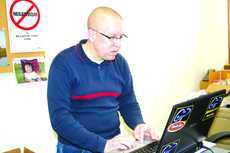Students battle e-mail virus problems

February 4, 2009
Simpson College students and network technicians recently faced a new outbreak on campus: computer viruses.
Hundreds of students have had their computers malfunction after opening e-mails that were marked as Hallmark e-cards, but were in fact viruses.
Widespread viruses of this amount are not common around campus, and the outbreak came as a surprise to the many students that were affected.
Kurt Gocken, Simpson’s PC and network technician, handles a lot of virus situations on campus, and said recent problems exceed those from years past.
“This year has been the worst for viruses since the network viruses in 2003,” Gocken said. “I think it goes in a cycle. For example, people tend to forget to be cautious when it’s been a few years since they received an e-mail with a virus attachment. So far, we have 200 students and counting that were affected by these viruses”
Junior Lynette Snyder was one student that was affected.
“I was actually waiting to receive an online Hallmark card from a friend,” Snyder said. “So when I saw the e-mail, I didn’t think anything of it and opened it.”
According to Snyder, the virus looked like a regular Hallmark card e-mail.
“When I opened the attachment, I knew something was wrong,” Snyder said.
After opening the e-mail, Snyder’s computer started to lock up and the antivirus protection programs started popping up.
“My computer kept freezing up,” Snyder said. “I ended up having to reboot it around three times a day.”
The booting and rebooting of the computer was more of a hassle than a problem, Snyder said.
Gocken agreed that when a virus is opened, the computer is basically useless until the computer can be cleaned.
Even though Snyder took her computer to get fixed, she said the affects of the virus still remain despite being cleaned out.
“I took my computer into Information Services, but my computer seems to still have the virus,” Snyder said.
According to Gocken, computers can still have a virus or be more susceptible to a virus once one is opened.
“Detection of viruses doesn’t seem to be difficult anymore,” Gocken said. “Most people know when they have one.”
If students don’t recognize the signs, students can help protect their computers by taking necessary steps to avoid a virus including running a weekly virus scan that can help with detection.
“The best antivirus is to prevent harm to your computer,” Gocken said. “Don’t download files from un-trusted sources and never open an e-mail attachment that is questionable. If you are unsure, contact the sender and ask them if it was an intentional attachment. Most viruses of late are acquired, not contracted.”
Snyder said she’ll be more cautious about opening e-mails from now on.
“I thought that Simpson’s service was fairly safe,” Snyder said. “I guess I will just have to be more aware of what attachments I open in the future.”
However, some Simpson students just delete most of their e-mail due to the masses students get on a daily basis.
“Unless I know it pertains specifically to me, I just won’t read the e-mail,” freshman, Abby Heim said. “This way, I don’t have to worry about opening viruses, and it saves me a lot of time.”
Students who believe they may have opened a file containing a virus can take their computers to Information Services to have them inspected.











